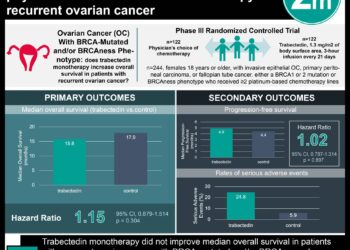Intraperitoneal chemotherapy may be underutilized in ovarian cancer
1. In a prospective cohort study of over 800 patients with stage III ovarian cancer, less than 50% of all eligible patients received combined intraperitoneal and intravenous (IP/IV) chemotherapy during the study period.
2. The use of IP/IV chemotherapy was associated with an increased rate of 3-year overall survival compared to IV chemotherapy in this cohort, but was also associated with significantly increased rates of chemotherapy delivery route change or discontinuation compared to IV chemotherapy.
Evidence Rating Level: 2 (Good)
Study Rundown: Combined intraperitoneal and intravenous (IP/IV) chemotherapy has previously been shown to be effective among women with optimally resected stage III ovarian cancer in multiple randomized controlled trials. Based on these findings, the National Cancer Institute (NCI) endorsed the use of IP/IV chemotherapy in 2006. However, barriers such as treatment toxicity, patient preference, the lack of standard guidelines, and inconvenience have limited its use. The purpose of this prospective cohort study was to evaluate the implementation of the NCI recommendation across multiple large cancer centers in the United States.
The study followed over 800 patients with stage III ovarian cancer for IP/IV chemotherapy use from 2003 to 2012. Additionally, the study compared survival outcomes between patients IP/IV versus IV chemotherapy during this time period. At the conclusion of this cohort study, the authors found that less than 50% of eligible patients received the recommended IP/IV chemotherapy with significant heterogeneity in treatment implementation rates between various cancer centers. Overall, the use of IP/IV chemotherapy was associated with significantly improved 3-year overall survival compared to IV chemotherapy, but with increased rates of discontinuation or change of chemotherapy. The results of this study support the hypothesis that IP/IV remains an underutilized treatment modality in ovarian cancer management. However, the study was limited by the observational design. Outcomes for different IP/IV regimens were not compared. Furthermore, the study did not control for potential selection bias in clinicians selecting healthier patients of IP/IV treatment, which may confound the survival benefit effect. Nevertheless, this was one of the first studies to analyze IP/IV use among women outside randomized trials and the first to demonstrate the gap between the official recommendations for IP/IV and clinical practice in oncology.
Click to read the study in JCO
Relevant Reading: Intraperitoneal cisplatin and paclitaxel in ovarian cancer
In-Depth [prospective cohort]: Researchers analyzed data from the National Comprehensive Cancer Center Network (NCCN) Ovarian Cancer Outcomes Database, a prospective cohort established in 2005 in order to chart the use of IP/IV chemotherapy following its recommendation for clinical use in 2006. Overall, the study enrolled 823 patients with stage III, optimally cytoreduced ovarian cancer across 6 cancer centers in the United States. The primary outcome was to study the rate of chemotherapy use from 2003 to 2012 (cohort 1). From this group, the study included 498 patients receiving IP/IV chemotherapy after 2006 and compared overall survival versus a propensity-matched group receiving IV chemotherapy (cohort 2). At the conclusion of the study, 35% of all patients in cohort 1 underwent IP/IV chemotherapy. The rate of IP/IV chemotherapy use increased from 2003 to 2006 (p < 0.001) to nearly 50% by 2007, then plateaued. The most common side effects associated with IP/IV chemotherapy were anemia (10.9% vs. 5%; OR: 2.2; 95% CI: 1.04-4.65) and increased hospitalization rates (14.4% vs 10%; OR: 1.47; 95% CI: 0.82-2.64) compared to IV chemotherapy groups. IV/IP patients were more likely to change treatments due to associated toxicities (20.4% vs 10%, OR: 2.83; 95% CI: 1.47-5.47) compared to IV chemotherapy. IV/IP patients had improved 3-year overall survival rate compared to IV chemotherapy (81% vs. 71%; HR: 0.68; 95% CI: 0.47-0.99).
Image: PD
©2015 2 Minute Medicine, Inc. All rights reserved. No works may be reproduced without expressed written consent from 2 Minute Medicine, Inc. Inquire about licensing here. No article should be construed as medical advice and is not intended as such by the authors or by 2 Minute Medicine, Inc.







